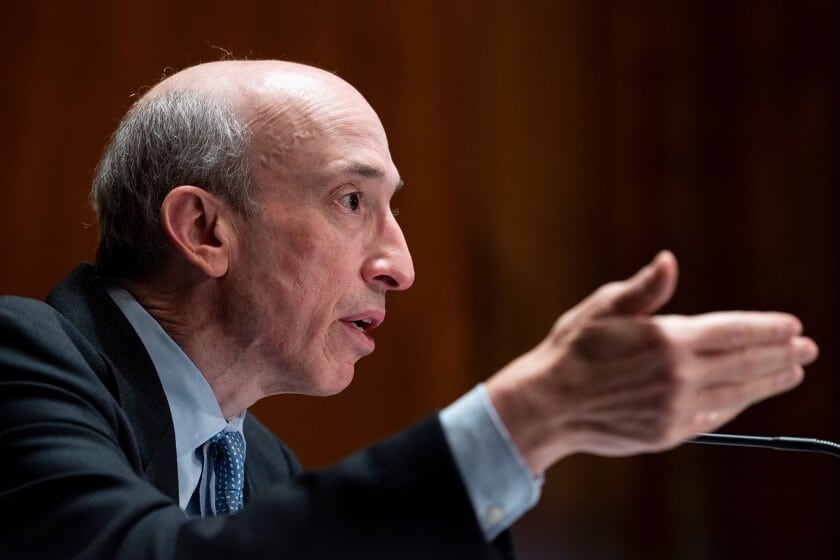
As the Securities and Exchange Commission reopens the comment period on proposed rules to increase transparency in the derivatives market, industry experts are questioning data put forward by the agency on the draft regulation’s impact on activist investors.
The proposal was intended as part of a broader push to protect the markets following the collapse of Archegos Capital Management LP, but activist fund managers complain that if approved it would have the unintended consequence of hurting their ability to drive needed change at targeted companies. Corporate advisers contend earlier disclosure would help them better protect companies.
The first section of a June 21 SEC report suggested that very few activists who filed 13D reports during a one-year sample period would have had to to disclose their positions earlier if the disclosure rule had already been in effect. Activists file 13Ds when they own 5% or more of a company’s common shares, and if they also own derivatives, they need to disclose that as well.
But the memorandum’s review of 13D filers with cash-settled swaps positions is “exactly the opposite” of what advisers to companies are concerned about, said one adviser to companies targeted by activists.
“Activists file 13Ds with common shares occasionally disclose that they also own swaps positions,” the adviser said. “But that isn’t the data set we are concerned about. The whole point of buying derivatives is to avoid filing a 13D.”
The 20-page study issued by the SEC is intended to encourage experts following the rulemaking to file new comments about how the proposal might impact activist investor campaigns. Advisers to activists and companies, however, both agree that the collection of data in the memorandum isn’t useful in identifying the extent to which activist investors employ cash-settled equity swaps for their campaigns — or how the proposal if adopted would affect their strategies.
The study would be more effective if the agency looked at situations in which activists with large derivatives positions that subsequently take their campaigns public would have had to disclose their cash-settled swaps positions earlier had the commission’s disclosure proposal been in place, the adviser to companies added.
Elliott Management Corp., for instance, is a big employer of cash-settled swaps. The fund frequently buys derivatives positions and engages with companies, and it typically doesn’t acquire enough equity — if it buys any at all — to breach the 5% 13D threshold.
The Paul Singer-led activist fund reported a 13% economic exposure to NRG Energy Inc. (NRG), worth about $1 billion, that’s likely in derivatives. The fund wants to remove the company’s CEO.
“At the end of the day, there are clearly situations where derivatives are being used in levels above the 13D 5% [common shares] disclosure threshold at large companies, where disclosures that would otherwise be available are lacking,” the adviser said.
The agency’s report also included a broader set of data, employing a FactSet Research Systems Inc. list of activist funds, and it reviewed derivatives activity as reported to the agency’s recently launched security-based swaps data repositories.
The memorandum noted that at most seven activist investors held gross positions of greater than $300 million — one of the proposal’s disclosure thresholds — on any given day during a yearlong sample period between 2021 and 2022.
A large segment of the market, however, likely involves derivatives investments by activists or others that don’t actually qualify as activist investments, said Ele Klein, partner at Schulte Roth & Zabel LLP.
Very few activist funds are capable of taking $300 million positions, in common shares or derivatives, in publicly traded companies, said Klein, who advises activist investors. As a result, it’s possible that some positions were held by nonactivist investors, or perhaps activists seeking to offset long-only risk at other companies.
“Most activists can’t or won’t take that large a position,” he said. “And just because some activists are capable doesn’t mean that many of them actually would take such a large position at one target.”
A more select set of data surrounding specific activists that have a record of buying large derivatives investments and launching campaigns was needed, the company adviser said.
“You would have to look very specifically at certain activists and see if they would have needed to disclose positions earlier with the rule,” the adviser said. With the new SEC data set, “it’s hard to tell which investors are truly activist and which of the swaps investments are part of a much bigger portfolio of investments that aren’t activist situations. You would have to take a more sophisticated thoughtful approach to the data.”
The corporate adviser agreed that not many activists will own $300 million or more in derivatives in a particular situation. He noted, however, that every year a few activists, such as Elliott, will buy large derivatives positions. As a result, he added, the $300 million threshold makes sense.
“A $3 billion position may just be 1% of the shares outstanding, but it represents a large investment at a megacap company, and should be disclosed,” the adviser said. In many cases, that 1% share is enough to launch initiatives intended to drive M&A or other changes.
Editor’s note: The original, full version of this article was published June 30, 2023, on The Deal’s premium subscription website. For access, log in to TheDeal.com or use the form below to request a free trial.



